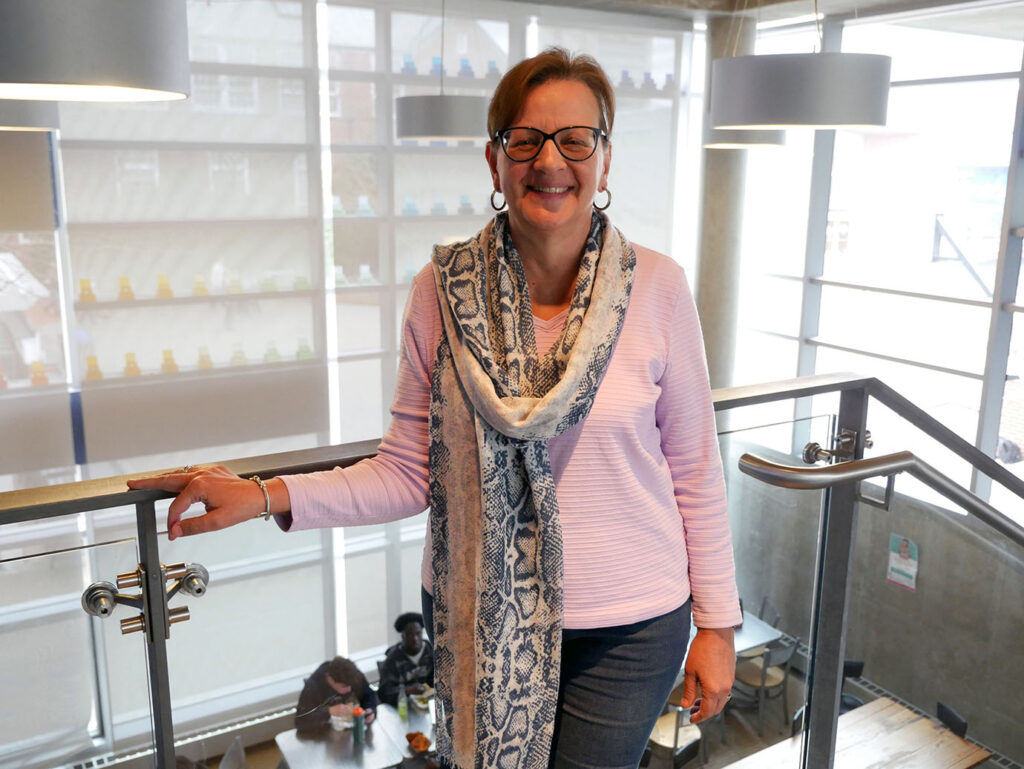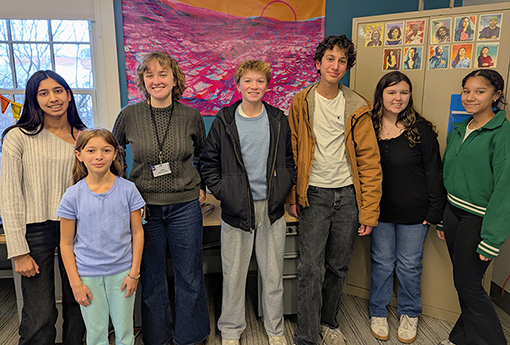
The Art of Problem Solving and Communicating Over a Curious Career
May 23, 2025

“I came to Wheeler entirely by accident,” says Judy Poirier, who, after four decades of teaching and guiding students and faculty alike, will retire at the end of this school year. “I applied to a job at the Lincoln School, and their head of school at the time told me that they had just hired someone for the position, but she suggested that I go down the street to talk with her friend at Wheeler, [former Head of School] Bill Prescott, who was also looking for a middle school math teacher.”
She ended up getting the job, and despite the accidental nature of her arrival 44 years ago, Ms. Poirier and Wheeler ended up being a great match. Though she started in Middle School as a math teacher, she went on to serve every division, both as a faculty member and an administrator.
“One of the most interesting things about Wheeler is that when I started here, the school was smaller and you were able to move around from position to position,” Ms. Poirier reflects. “The way to keep people that you think are good teachers and good for your institution is to be smart and flexible enough to be able to make new opportunities for them. In my case, I knew I wanted to do curriculum development and evaluation beyond my own teaching, and I wanted to coach teachers in the classroom. So when Wheeler’s assistant head of school was leaving, and I learned that he wasn’t going to be immediately replaced, I told Bill that I could do some of that work and also still teach math part time. He said that would be great, and I went on to serve as academic dean from 1988 to 95, and then as assistant head of school from 1995 to 2018.”
Ms. Poirier conducted many class visits and evaluations over that time, and she took pride in all of them. “I had learned a good objective observation model in graduate school,” she explains. “After observing their class, I would ask teachers questions like, ‘What are you curious to know about your teaching?’ Maybe it was students’ participation. So I’d create a participation map and show them things they may not have been aware of due to their vantage point in the classroom. We’d talk about it and think about things like the kinds of questions they asked during the lesson, and consider the depth of knowledge reflected in each of those kinds of questions. I had a good ability to do objective data collection that teachers found pretty helpful. I also believe that continuing to teach a math class every year while an administrator allowed me to share the lived experience of teachers, making conversations about teaching and learning authentic, not to mention the joy it brought me every day!”
In her administrative role, she was also helpful when it came to navigating challenging conversations among colleagues and departments. “I mediated a lot of discussions in various department meetings where issues would be raised and people would disagree. I’d help them think through the issue and the different arguments associated with it, and find a solution. Often it was a bit of a negotiation, but we’d go through the process and get there together.”
When it comes to bringing together different perspectives, Ms. Poirier also discovered an interesting intersection between two seemingly disparate academic disciplines. “One of the other reasons I’ve loved Wheeler is because of its emphasis on the arts. I appreciate the school’s allegiance to Miss Wheeler and her remarkable sense for how you build an incredible curriculum. In that spirit, I found that I could take my lens of problem solving as a mathematics teacher, and apply it in the observations I made when evaluating a teacher in art class. I recognized they were incorporating the same higher order thinking skills we used in math class when approaching art with their students. When creating visual and performing arts at Wheeler, it becomes a creative problem solving exercise for our kids.”
Whether she’s writing an article about the intersection of the arts and math, or coaching a teacher as part of the evaluation process, Ms. Poirier says she has always had a knack for communicating subjects with clarity and connecting with others – two skills she has used in her math teaching every year at Wheeler. She also highlighted those same strengths in a pitch she made a few years ago, when the Cityside at Wheeler Program was starting. I went to [Cityside Director] Joe [Baer] and [Head of Strategic Innovation] Young [Un] and said I was interested in teaching in the program. I am driven by curiosity, and it’s one of the reasons that I felt I could be a good match for Cityside – I’m just insanely curious about stuff. There’s always a ton of questions to ask, a challenge to figure out, or something new to learn. I’m fascinated by what the kids want to talk about, and I love thinking with them about how those interests align with local organizations around Providence.”
She landed that position, too.
“Every one of my jobs here has been intellectually stimulating, and my friends will say that’s because I’ve created opportunities for myself,” Ms. Poirier says. “Each time, I saw a need and I could envision myself in those roles. And then I made a case for how it would benefit the school. Every shift that I took on was pretty much the kind of situation where I developed a plan, talked with school leadership about it, and they saw that it could really help Wheeler. My journey here is evidence of the school’s continual drive to innovate. It’s been a privilege to have had a small part in contributing to Wheeler’s academic excellence over all these years.”

